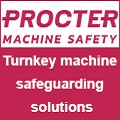
Posted to News on 13th Mar 2014, 10:55
Why barcoding is a must for a motor manufacturer
Late or inaccurate delivery of industrial equipment could derail the promised pickup of manufacturing activity, slowing the national recovery and compromising the idea of rebalancing the economy with a stronger manufacturing base. Lucie Hodkova, Sales Director UK & Eastern Europe of Rotor UK explains how overlapping technologies help secure accurate and timely motor supply.
We are all used to seeing senior executives from the retail sector appearing on prime-time television news, explaining the intricacies of running a first-class high-street store. Essentially, this comes down to maintaining enough stock on a day-by-day (if not hour-by-hour) basis, while not overstocking in case market requirements change. This discipline is compounded because each store has multiple product lines, different sizes, fast and slow moving goods, etc.
When a media-savvy celebrity businessperson explains this in relation to a supermarket or fashion and clothing store, most TV viewers will nod their heads sagely in appreciation of the complexity of the undertaking.
Running a motor warehouse that serves a large market area such as the whole of the UK is an equally complex business. There are many different types of motor, most of which have multiple formats, come in a wide range of sizes, possibly in imperial or metric versions, and different pole and winding configurations. Then there are complementary products such as brake units, gearboxes and clutches; starting options including direct online, star delta, soft starting and inverter control. Added to this, some industries have special requirements or unique standards for say, hygiene or harsh environments. Plus, you have to allow for call-off orders, urgent orders and then also provide high-level technical support.
In short, running a motor warehouse is a complex business. Many, many things have the potential to go wrong.
The core requirement of running any stockholding operation is accurate records - knowing exactly what you have on your shelves. These must be updated with every transaction; the minute a motor is sold the records need to be changed. The next issue is to know precisely where every item of stock is located. This will allow you to achieve a steady stock rotation, usually based on "first in, first out', so that you do not end up with ageing stock gathering dust on the back of the shelf until it becomes unfit for sale.
Increasingly, customers are requiring full traceability from manufacturing process to motor despatch. This means keeping a full set of records for each individual motor and passing them on to the customer at dispatch. The customer may then integrate these manufacturing and logistic records with installation and operational data so that they have a full up-to-the-minute history of the motor.
Not that many years ago, the way all of the above criteria would have been met was with a mountain of paperwork. This would have taken time to fill in, so would have been expensive.
Storage and retrieval
It would also have been susceptible to human error, mainly from incorrectly copying down long reference numbers and filing papers in the wrong place. There was also the issue of storage and retrieval: space needed to be found for the old records, and importantly, they had to be kept in an orderly fashion to allow easy manual searching.
Fortunately, computers have taken over much of this function. A modest desktop can store information in a database for many years in a small space. Information retrieval is usually a matter of a few mouse clicks on a well-designed navigation page.
The weakness of a computer-based system is usually the human interface. The computer will happily store whatever information is put into it - whether it is right or wrong - and will usually have no way of testing the accuracy of its incoming data.
Human error can be largely designed out by using barcode data handling. Every motor coming into the warehouse has a barcode, usually one that was assigned at the start of the manufacturing process, but alternatively, one could be given at the warehouse door. With a barcode in place, all that the warehouse personnel need to do is "zap' the code with the barcode reader (which in an industrial motor warehouse is likely to look a bit like a pistol and is very mobile, but in other situations such as a supermarket checkout a fixed reader may be preferred).
The code will individually identify each motor and the reader sends this information to the database on the computer. Zapping at goods inwards loads each new motor's information into the database including serial number, technical specification, time and date of arrival, plus other relevant information. Once the motor is transferred into stores, its location can be uploaded to the database via a second, position barcode.
When the sales or dispatch department want to order a motor from stores, they can simply enter their requirement into the computer and the barcode information will identify the correct motor for picking, making sure it selects the motor that has been longest in stock to ensure steady stock rotation.
Growing with integration
Therefore, we see that a simple, robust and reliable barcode system can transform warehouse operations and improve efficiency to somewhere close to 100 per cent. But that is far from the whole story; there are many added benefits that can make the whole enterprise more integrated and thereby improve customer service.
These benefits mainly accrue from real-time computer analysis of the database. A simple benefit would be to set up alerts that trigger when stock levels of certain lines are too low or too high, to order more or cancel a standing replenishment order. Another very real advantage is that a motor can't be "sold twice', a common problem with manual systems when a motor has been sold but is awaiting dispatch or collection.
A more sophisticated option would be to set up an algorithm which analyses current sales trends, predicts future sales and raises purchase orders accordingly. This would also allow optimisation of stockholding to minimise costs while improving customer service.
Another advantage is that the databases from several related warehouses can be integrated. A motor maker, for instance, may have a warehouse serving the UK plus two or three others located strategically around mainland Europe. Being able to interrogate the stock of all of them would mean that the holdings of more unusual motors can be reduced from a critical level for each warehouse to a pan-European level.
Massive advantages can be gained by issuing regular customers with their own scanner. They then become responsible for managing their own accounts and logistics, and they can plan ahead, expedite urgent orders, specify bespoke options, etc.
Finally, it is easy to export the database information to a web-based system, enabling online ordering to be set up. Concerning online ordering, a very important milestone was reached just recently: this year, in the UK, more Christmas shopping was done online than in person. Where the retail world leads, industry will surely follow. Rotor UK is almost certainly not the only industrial supplier to be experiencing accelerating growth in its online orders. A full set of data sheets, dimensional drawings and type test certificates are also available, allowing the full selection procedure to be accomplished. The website is designed from the users' point of view, so is intuitive and simple to use.
For further information about Rotor's motors and other products, please go to www.rotor.co.uk.
Want the latest machine building news straight to your inbox? Become a MachineBuilding member for free today >>
Unit 8, 16 Everitt Close
Denington Industrial Estate
NN8 2QF
UNITED KINGDOM
+44 (0)1933 230900















